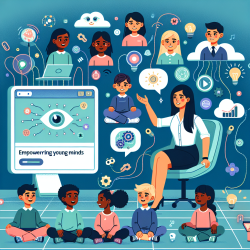Introduction
As practitioners dedicated to improving child outcomes, we constantly seek effective strategies to enhance our skills and services. The research article titled "Increased frequency of visits improves the efficiency of surgical global health initiatives" provides valuable insights that can be adapted to our field. By understanding and implementing the findings of this study, we can refine our approach to delivering online therapy services, such as those offered by TinyEYE, to schools and beyond.
Key Findings from the Research
The study examined the impact of increased visit frequency by foreign surgeons on the surgical output of local surgeons in Uganda. The key findings were:
- A 24-fold increase in annual middle ear surgeries was observed with the introduction of more frequent surgical visits.
- Local surgeons became more competent and independent, performing surgeries with and without foreign assistance.
- The increased frequency of visits correlated with improved local surgical output, suggesting enhanced skills and confidence among local practitioners.
Application to Online Therapy Services
While the study focused on surgical initiatives, the principles can be applied to online therapy services. Here’s how practitioners can leverage these findings:
- Frequent Interactions: Just as increased visits improved surgical outcomes, frequent interactions with clients can enhance therapeutic outcomes. Regular sessions allow for continuous monitoring and adjustment of therapy plans, leading to more effective interventions.
- Collaborative Learning: The collaboration between local and foreign surgeons highlights the importance of shared learning. Online therapists can benefit from peer collaboration, sharing insights and strategies to improve service delivery.
- Building Competence: The study showed that increased exposure and practice led to greater competence among local surgeons. Similarly, online therapists can enhance their skills through regular practice and exposure to diverse cases.
Encouraging Further Research
While the study provides a robust framework, further research is essential to tailor these findings to online therapy. Practitioners are encouraged to explore:
- The optimal frequency of therapy sessions for different conditions and age groups.
- The impact of collaborative learning on therapist skill development and client outcomes.
- Strategies to enhance client engagement and retention through frequent interactions.
Conclusion
By integrating the insights from this research into our practice, we can improve our service delivery and ultimately achieve better outcomes for the children we serve. To read the original research paper, please follow this link: Increased frequency of visits improves the efficiency of surgical global health initiatives.










